Gina Crawford’s rollercoaster 09
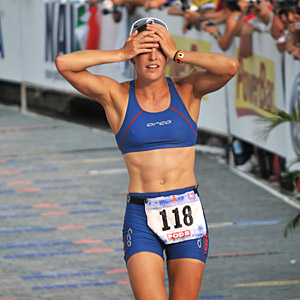
Gina Ferguson Crawford is a late blooming 29-year-old from Canterbury, New Zealand who started her triathlon career just five years ago and rose quickly to prominence. Upon turning pro in 2007, she has put together six Ironman distance wins and two sub-nine hour Ironman marks with a win at Ironman Wisconsin (2007), two victories at Challenge Wanaka (2008 and 2009), two wins at Ironman Western Australia (2008 and 2009) and ending Jo Lawn’s six-win streak this year at Ironman New Zealand.
Her bright future in the sport was hit by storm clouds this year in a series of setbacks that included an ankle injury, various race mishaps, and a frightening, recently discovered heart abnormality that, at least for now, does not present a threat to her athletic career.
After wins at Ironman New Zealand and Challenge Wanaka, a combination of increased caffeine consumption and a bout of the flu led her to pass out for two hours after the bike at Quelle Challenge Roth. During a physical exam back home in New Zealand to diagnose the source of the problem, doctors found she had a genetic heart abnormality known as bicuspid aortic valve. While this is the very same condition which led Torbjorn Sindballe to retire, Crawford was relieved to discover her case was different and did not involve dangerous leakage which left her free to continue training and racing. However, Crawford encountered several other problems – flu and projectile vomiting which forced a withdrawal from Ironman Wisconsin, a severely twisted ankle which curtailed her training, and a bad case of premenstrual syndrome that led it a DNF at Ironman Hawaii. But with uncommon perseverance, she closed out 2009 with a confidence-restoring repeat win at Ironman Western Australia.
While Crawford's race resume quality has risen fast, she still stands a few notches from the very top. Judging by her personal best marks, her 48-50 minute swim is already there. Her 4:56 to 5:12 bikes have about 10 minutes to go to compare with Wellington and Badmann, and her 3:03 to 3:15 Ironman marathons could use another 7 minutes to contend with the sport’s absolute best. The good news is that since starting the sport cold at age 24 after 7 years of athletic limbo, she still has many quality miles left on the odometer and the arc of her improvement curve surely has not reached its summit.
While her triathlon success is considerable, Gina Crawford has filled her life with far more than her sport. She graduated from New Zealand’s Canterbury University with a double major in Psychology and Music Performance. She plays violin part time with the Christchurch Symphony and savors time at home in the off season teaching the instrument to young students. She has a passionate concern for safeguarding the ecological health of New Zealand’s grazing lands, streams and water supply against rising pollution from corporate farming methods. And she is committed to preserving her body’s health with natural foods, avoiding artificial and processed foods and other modern nutritional and medicinal shortcuts.
Slowtwitch: What is your family background?
Gina Ferguson Crawford: My parents immigrated from Cape Town, South Africa to New Zealand a few years before I was born on November 20, 1980 in Christchurch. My dad Bruce Ferguson works in the financial sector and has always been a very keen cricketer and my mum Denise works as a science technician. My parents both recently took up bowls and are loving it!! (Not indoor bowls like in America but lawn bowls).
My sister Gayle is 3 years older than me and has a PhD in science and works at one of our Universities in Auckland, New Zealand. She is not a competitive sports person but loves her outdoor pursuits particularly water sports and rock climbing. My brother Chris is 4 years younger than I and works for New Zealand Cricket. He is obviously a cricket nut, plays himself and coaches little kids and also loves watching rugby.
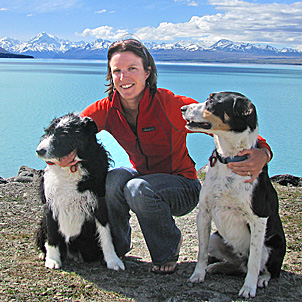
ST: What were you like as a kid?
Gina: Very overactive. I did a lot of activities. My mum was the middle child and as I was the middle child she wanted to make sure I wasn't neglected so I did a lot. I never really had much spare time growing up. Swimming, gymnastics, netball, violin, piano to name a few. I was very fortunate to have such dedicated parents.
ST: What sports did you like growing up – and why?
Gina: I liked swimming because I was good at it. I broke a lot of swimming records as a younger kid but grew bored of the training at around 13 as I really just wanted to hang out with my friends. At that point my parents made me stick at it, but I only had to do it twice a week. I got serious again at 16 for a couple of years. The sports I liked were all individual ones because I found it hard to do team sports as I wanted to do everything myself. I liked doing athletics in school sports. I liked all the different things like long jump, high jump, sprints. I was good at the long distance and would win the cross country every year but I absolutely hated it — I would try anything to get out of doing it. I love watching tennis but I can't play it, I can't do anything that requires aim.
ST: Did you have any heroes in any sphere of life growing up? Any sports figures from New Zealand that you followed or admired?
Gina: I don't think I really did. I would love watching the Olympics and Commonwealth Games as that was one of the few times I would be able to see individual sports people. I would marvel at their fit looking bodies and how fast they could go, especially in the sprints at the athletics, but I didn't have anyone that I idolized.
ST: What did you study at University?
Gina: I did a double degree — a Bachelor of Music in performance – violin – and a Bachelor of Arts in psychology. I did my first two years at Victoria University in Wellington and my second two back home at Canterbury University. I obtained the top marks in my Psychology course but I was not very ambitious and didn't want to study for another three years to be a clinical psychologist instead opting for a one year diploma in teaching (music and mathematics) so that I could start working and earning money sooner!!!
ST: Any sports at Uni?
Gina: I did no sports whatsoever at Uni. I stopped swimming at 17 and didn't do anything again until 24 when I started running and cycling and swimming again.
ST: What led you to triathlon?
Gina: In 2004 I started going to the gym to get fit after I guess 7 years of doing nothing. I would go on the treadmill and would start out slow and then would increase and increase until the max. People kept asking me what I was training for and I kept saying ‘Nothing.’ They kept saying I should be training for something. I started to get sick of those exchanges so I bought a bike and entered a women's triathlon that was becoming very, very popular at the end of 2004.
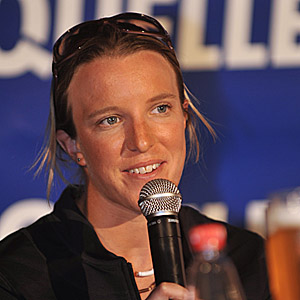
ST: What were the distances and how did it go?
Gina: The first one was the 200m, 15k, 2k. The swim was in a pool and we started in groups of 4, after that I got out and got changed into shorts and t-shirt etc for the 15k cycle that I thought was a huge, huge distance, and I found it really long and hard and then I enjoyed the 2k run. I wasn't a natural by any means, I think I came 3rd in the 20-24 age group.
ST: What did you think of it?
Gina: I absolutely loved it so I started training. I couldn't believe after hating running for my whole life that it now didn't feel so hard and I actually enjoyed it. So I entered a series of six 5k races and won them all and improved my time by 2 minutes in 6 weeks. I also did a series of aquathlons and won them all, so I decided to do an Olympic distance tri in March 2005. I loved it and never looked back.
ST: When did you start to take triathlon seriously?
Gina: After my first Olympic distance in March 2005 I entered a triathlon in Rarotonga in the Cook Islands, (1,850 miles east northeast of New Zealand) in May 2005 so that we could go there on holiday. I was so determined not to get last as the idea of everyone waiting around for me to finish really scared me. I won the race and had this huge adrenaline rush and didn't sleep for three days I was so excited. So I guess after that I was addicted to the adrenaline and then I got a coach and started training 10-15 hours per week.
ST: What was your breakthrough triathlon performance that let you know you had world class talent?
Gina: All the races I did in 2005 and 2006 were short distance and I wasn't really that serious, not world class by any means. In June of 2007, Triathlon New Zealand brought out the Contact Energy National Triathlon Series with prize money that included $1000 for 1st place. I raced all of them that summer and won all but one. I also did a series up in Auckland called Stroke and Stride which was held on Wednesday afternoons. I would catch a plane from Christchurch up to Auckland after work, do the race and stay at a backpacker’s and come back Thursday morning early. Everyone thought I was nuts as I raced nearly every single week, I couldn't get enough, I also did two half Ironman races and then my first Ironman I came 5th and finished the season with a win at XTERRA New Zealand. I guess I certainly got noticed that season.
ST: At Quelle Challenge Roth in 2008, you and Belinda Granger broke into the lead on the swim with 48s to Yvonne Van Vlerken and Erika Csomor’s 53:30s. Then Van Vlerken and Csomor biked past you with 4:54s to your 5:01. When did those two pass you and did you save anything for the run?
Gina: Yvonne and Erika passed me at around the half way mark, they were with a small group and I didn't stick with them. That race was so different to any other as I was so cold. I just was shaking and shaking on the bike, could not keep warm. I was in a bad mental way on the bike, I was miserable from the cold and I didn't think I had that much of chance at all to come top 5 let alone top 3.
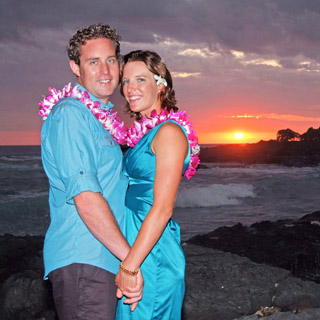
ST: Finally you preserved third with your 3:03 run and set a PR for the distance with an 8:57. Do you feel you could ever go faster? What parts of your bike and run can improve and how?
Gina: Once onto the run though I felt very good and did my best run time. Yes I can go faster in the right conditions. I still have much work to do on bike and run. I need to improve my endurance and power on the bike and try harder on the run. Brett (Crawford, her fiancée, now husband) always says I run like I am jogging. When I run fast, you can't hear me breathing. He tells me the other girls are trying so much harder than me. It is a mental thing I need to work on to know that my body is capable of much more than I think it is.
ST: In your second sub 9 hours at Busselton in 2008, you built up a 10 minute lead over Charlotte Paul on the swim and bike. But when she began to eat into your lead on the run, (3:06:28 to 3:09:06) how did you manage your resources and when did you know you could break 9 hours?
Gina: That was a difficult race too as I had a problem with my aerobar. It came loose at around 70k into the ride and I had to hold it in place with both hands, I forgot to eat as much as I should and when I started running I began to see black and white squares. I just tried to go as fast as I could manage but I always wait until I start to feel better which I think was at two-thirds of the way in. Then I felt fine and increased my pace a bit and pulled away from her again. I didn't worry too much about Charlotte Paul as I can't control how she runs only myself, so I just focus on keeping myself going and eating as much as I could to make up for my bike. I don't run with a watch so I had no idea about the time until I reached the grass and could see the clock, 200m or so from the end. I saw it was 8.58 or 59 so I just pushed it as hard as I could to the end.
ST: Looking back, any clues that you had this congenital heart issue?
Gina: When I was a kid I would always have this chest pain now and then and I would always say I'm having a heart attack and I would be told don't be silly it's just heart burn. It probably was as there is no problem with my heart, it is different than other people's hearts but it is healthy.
ST: What happened when you fell unconscious at Roth?
Gina: I started to feel light headed in the second half of the bike ride, I then took a gel as I thought I must be hungry, it worked for a while then a felt worse so took another then another. I had four in just over an hour and they all had 50mg of caffeine, so I consumed a total of 200mg. I am not a coffee drinker, caffeine hits me very hard and that was the first time I had caffeine in gels (I usually mix half a tab in one drink bottle to get a slow release. And so I don't know if I collapsed as a result of my flu the last few weeks or as an overreaction to the caffeine. I expect the latter as I was hyperventilating the last 5 km of the bike ride and caffeine can do that. The doctor thinks I am oversensitive to caffeine. Anyway whether that was the reason or not I have learned a valuable lesson.
Going back to the bike ride though, I don't think I was myself really as Belinda Granger said to me when she passed me at around 70km “Are you OK??” She never says that, she says I looked as white as a ghost. So something was wrong, it must have been both that I was still not OK from the flu and the caffeine hit me later.
I hyperventilated for last 5km then got to transition, picked up my bag and then decided to lie down I think to rest and then I got carted away by the volunteers straight to the medical tent. I couldn't breathe or talk and I couldn't move any part of my body. It was a strange and scary thing. I then must have blacked out and woke up I thought a few minutes later but it must have been several hours as when I did Chrissie Wellington just finished. My home stay family and Brett came and found me and we went home.
ST: When you went home, you had a doctor examine you to diagnose what went wrong, and that is when they discovered you had a heart abnormality. Can you tell us what that is and what it meant?
Gina: It is called Bicuspid Aortic Valve. One of my valves is divided in 2 instead of 3, that is all. On her blog, Gina explained further: “This is what I have learnt about bicuspid aortic valve so far. It effects about 1% of the general population although it is 4 times more likely in males than females (so I guess only 0.2% of females). Of those, one third will have serious complications usually in their 40's or 50's (about a decade before those with normal hearts). Most people never find out about this condition (and I wish I was one of them). A few weeks ago Torbjorn Sindballe had to retire from Ironman because of this exact condition. Sindballe had a long and successful triathlon career but his condition had reached a much more serious stage. He had a leak (which is much more likely to happen with this type of valve than a normal one) and therefore it was necessary to stop competing. There is not much research on the effects of exercise on these types of valves that I can find. Certainly not of an endurance sport such as Ironman. Most of the studies say it has to be decided on a case by case basis. So it is impossible to say if Sindballe's heart was made worse with the effects of Ironman or if his heart would have done this in his 30’s if he never did Ironman.”
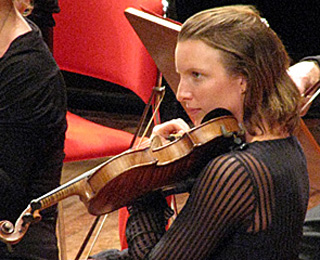
ST: When you first learned of your heart condition, how did it affect you?
Gina: Yes it really threw me. If I thought there would be a problem I would never have gone to those heart checks, I never thought there was anything wrong with me for a second. My doctor was very helpful he kept telling me there is no reason I can't keep racing, that I am healthy and lots of people have problems, but I was acting like it was the end of the world, I thought I was going to keel over and die any second. It was worse as I had only just read about Torbjorn Sindballe who had to quit racing a week or so before and then I find out I have the exact same thing. But of course the difference is that his valve was leaking, he competed very, very successfully for years before that. So yes I thought it was a major issue and I thought I would not race again until I received emails from people from all over the world with similar problems or way worse problems. I was surprised that so many ironman athletes actually took up the sport after finding out about a heart condition, so I soon realized I was in good company and soon forgot about it and moved on.
ST: What did you feel when doctors told you about it?
Gina: Angry and disbelief. I was pretty angry actually that my doctor had made me do the tests. He kept saying this is great to know isn't it and I was thinking “No, I would rather not know.” On her blog, Gina wrote more about her initial feelings: “I think there are 2 things you want to have when you line up for a race. One is a strong heart and the other is a strong head. Now I will have neither. I can never toe the start line again knowing that I am in perfect condition to get through the race. I now view myself in a different light. I always thought of myself as a strong and fit person and now I view myself as an invalid. Hopefully this will change with time as I get used to the idea.”
ST: When did it become apparent that it would not end your career?
Gina: After I received the many emails I realized I was being melodramatic. I went back to training and forgot about it, it seemed like a dream.
ST: OK. Tell us about this fabulously lucky Crawford fellow who won your heart?
Gina: Brett and I met in 1999. We were both working at Burger King. We have been inseparable ever since. Brett asked me to marry him a couple of days before that triathlon race in Rarotonga in 2005, but after that triathlon took over our lives. We both didn't want a big wedding with lots of fuss, so Kona sounded perfect and it was. Brett is such a huge support to me, I am so lucky to have him in my life.
ST: What is it like playing violin in the Christchurch Symphony?
Gina: Music has always been a passion for me from a very young age. I started violin at age 6 and it just clicked with me. I did one of my degrees in performance violin. It was a lot of work compared to doing an academic degree. I am naturally musical but I don't have the patience to spend hours and hours working on one little detail so I was much more drawn to a career as an orchestral musician as opposed to a solo career. I love playing in the orchestra, it is a lot of fun and very rewarding when you reach the end of a huge symphony.
ST: Are there parallels between the discipline and passion you bring to music and those same qualities required of a world class triathlete?
Gina: People always ask me this and I don't know if there are parallels. My mind is in a totally different space when I play violin as opposed to when I am racing, but they both require a lot of dedication and hard work.
ST: What particular symphonies by what composers you have performed with the Christchurch Symphony do you love and why?
Gina: I like Symphonies from the Romantic era. I love Tchaikovsky Brahms, Wagner and Beethoven. I just love all the emotions you go through to get to the end, and I like finishing and the crowd goes wild because you know they enjoyed it too. Also I like it when we finish with something quiet and the crowd is quiet for a while, spellbound.
ST: Why did you choose to get married in Kona on October 1 – before the Ironman World Championship?
Gina: We got married before the race. I didn't want to do it after as I didn't want to get married upset about a race if the race didn't go to plan. It was a good decision!! I was very, very upset about Kona 2009. So we picked a nice day a week or so before the race. It was at sunset just the 2 of us and then we had a beach picnic, very romantic. It made for a relaxed build up to the race. Our honeymoon was after the race back home in New Zealand with our two dogs, we traveled around the bottom of the South Island. I have to say I ruined it though as I was so upset about the race and couldn't let it go, so we have to do it again at a later time when I am happier.
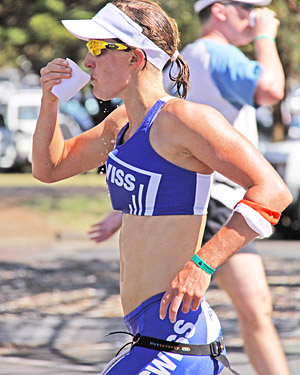
ST: You said that your DNF at Kona was due to distress caused by your menstrual cycle hitting on race day. You had some soul searching to do about how to deal with that going forward. You had a lot of people suggesting that you should simply take birth control pills – which was antithetical to your philosophy of personal health.
Gina: Sure, I'm sure it's an issue that many women in this sport have to deal with. I have not used the birth control pill while I have been racing these last few years and so each race has been a bit of a gamble for me but the World Champs was the first time I had to race with my period and it did not turn out well and I pulled out after a very disappointing bike. When many people urged me to take birth control pills, my instinctive reaction was that I don't want to take it as I don't want to mess around with my natural hormones and put all sorts of things into my body every single day for a period of years (there are a lot of things that I won't touch that many other people think is completely normal, it's just the way I am).
I didn't think racing with my period would effect me as much as I did. I knew it did in training but I thought in a race where you are focused on the task at hand a little pain would not be a problem as we are already in quite a bit of pain. But it turns out it is not so much the pain but just the feeling of fatigue and quite a big loss of power that is the real problem for racing. So after the race I discussed this on my blog, I wanted to know what other women did and I got quite a response with many people thinking it was good that I stood behind my morals as an elite athlete and many others that thought I was stupid to not take the pill and risk having a bad race, especially at the World Champs.
ST: Some of the give and take on your blog was pretty pointed.
Gina: There was one quote something on the lines of how can I put my health before my race results? Well that does sum it up. I do consider my health and well being more important than one race. Of course I like to perform at my best but I have accepted that I may have a few bad races but I hope to have many, many good ones.
ST: So with one race left in a tough year, what did you decide?
Gina: But this got me thinking, and I came to the conclusion that I was being selfish and needed to go into every race in perfect form (maybe at the expense of my beliefs) for the sake of my sponsors. And with Ironman Western Australia again scheduled for a bad day I had to do something, so I felt I had no choice but to try the pill. I actually was quite impressed with my doctor as he didn't like the idea. He felt it was good that we could monitor my health (having regular periods signals your body is in very good health, many women that compete at my level apparently don't have any periods at all) and by taking a pill you are hiding this key clue. Anyway he gave me a pill Yasmin very reluctantly as I said it would just be for a few months. Straight away I had problems, every day I woke at around 3am with intense nausea for around three hours, so much so I couldn't sleep and I was angry all the time. I would fly off the handle at any little thing and I didn't feel normal, also I put on over 2kg (4.5 pounds) in three weeks (and that's with training 30 hour weeks!!). I continued for three weeks and a couple of days after I stopped taking it I felt normal again. I don't want to take it again and am looking at other options but I believe I am fine to get through my next two races without those types of problems.
ST: How did finishing off a stressful 2009 with another big win make you feel? Relieved? Thrilled?
Gina: Both relieved and thrilled. Relieved as with the chain of things that happened in the second half of 2009 I was beginning to think that this was not the path that I was meant to go down, that I was meant to be doing something else, but I just didn't want to quit. Most people said don't do Ironman WA, have a break, forget about 2009 and refocus on 2010. Even race organizers rang me to make sure that I didn't think I should take a break (it's nice to know they actually care about you!) I didn't want to do that, I knew I had to try and redeem myself. I was also very, very happy as it was a tough race (12% of the field didn't finish) and I had proved to myself that I could do it.
ST: How much better can you get in your sport? What are your long term goals in triathlon?
Gina: I just want to do the best I can and reach my potential whatever that may be. I want to be an inspiration to people to get involved in the sport and become fit and healthy. If I can come out of nowhere and start winning these things I am hoping that other people will see that they can definitely give it a go.
ST: Any environmental, political or social causes catch your interest?
Gina: YES!! But really don't get me started. I get very angry about the things I am seeing going on in our world right now. I feel very helpless about it, it really gets me worked up!!
ST: OK, fess up. Tell us about one of your social, environmental or political concerns.
Gina: I will talk about just one. New Zealand has long been a country known for raising sheep. But now we are a country of dairy farmers and I am seeing my country change right before my eyes. My beautiful country is getting ruined with many of our rivers and lakes dying. Where I live in Canterbury is a dry part of New Zealand. We never used to have cows now they are everywhere. We get only 500mm of rain a year and typically the grass is brown in summer, so the farmers take water from our underground supply and they don't pay a cent for it, it is free for all and there is little to no restrictions, so the grass is beautiful and green but the runoff from the dairy cows is terrible. Just last week it has come out that they are planning on having our first indoor farm. Currently all cows are free to roam around outside. Some greedy farmers have bought cheap land in South Canterbury (cheap as it is unsuitable for farming cows) and are now trying to get the go ahead to have an indoor farm where the cows will be inside these pens for 12 hours per day 8 months of the year and 8 hours a day for 4 months. It disgusts me these greedy people. The government here does anything for the sake of the dairy farmers so I know it is likely to go ahead even though most of the country is against it and once it does many other farmers will follow suit. They have no morals when it comes to the welfare of their animals or the environment, they are just about the money. But what I can't understand is that the rest of the world sees us as a nation with standards for the environment and for animal welfare. Why would they then import our meat and dairy?? The farmers will suffer in the long term and the rest of our country too as we are built on the tourism industry which promotes New Zealand as 100% pure and it is a lie. We need to be doing everything we can to keep our country clean and beautiful or why would those from Europe or the USA travel many miles to come here? I have traveled all over Europe and parts of the USA and I can see what will happen if we don't do something about it now and it breaks my heart. The only thing I can really do is continue to support the good farmers out there by buying organic meat and dairy.


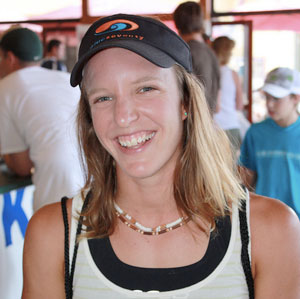
Start the discussion at slowtwitch.northend.network